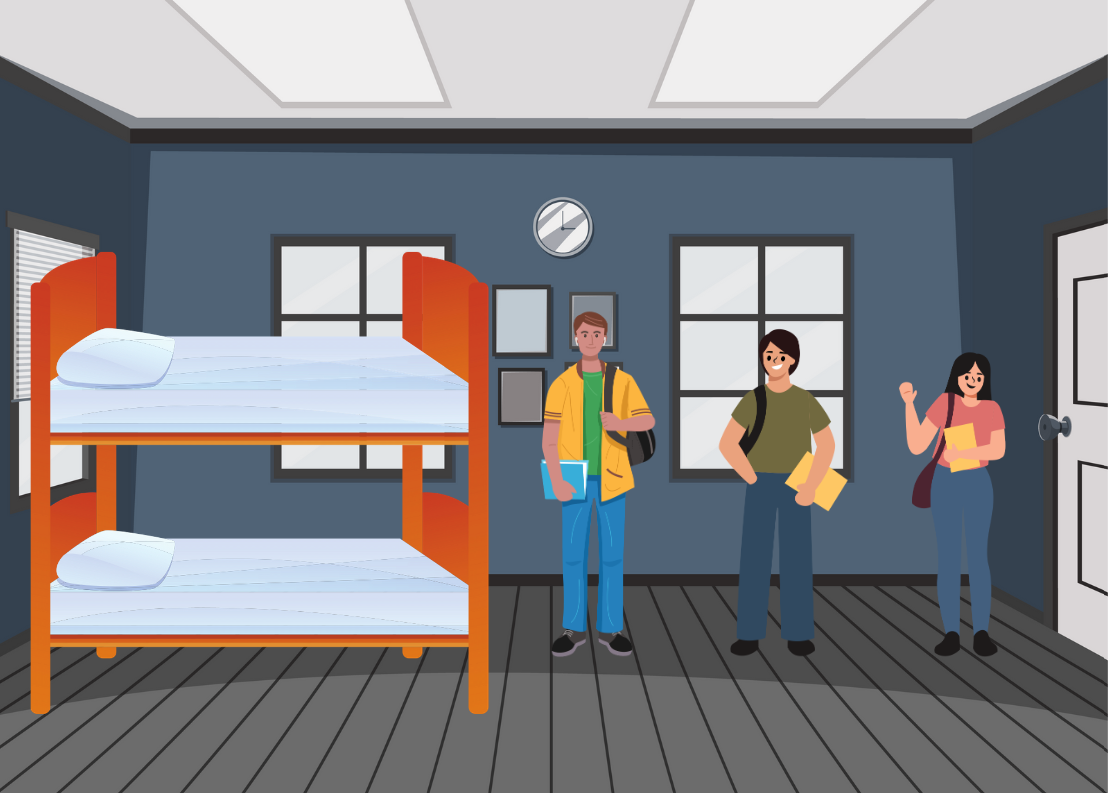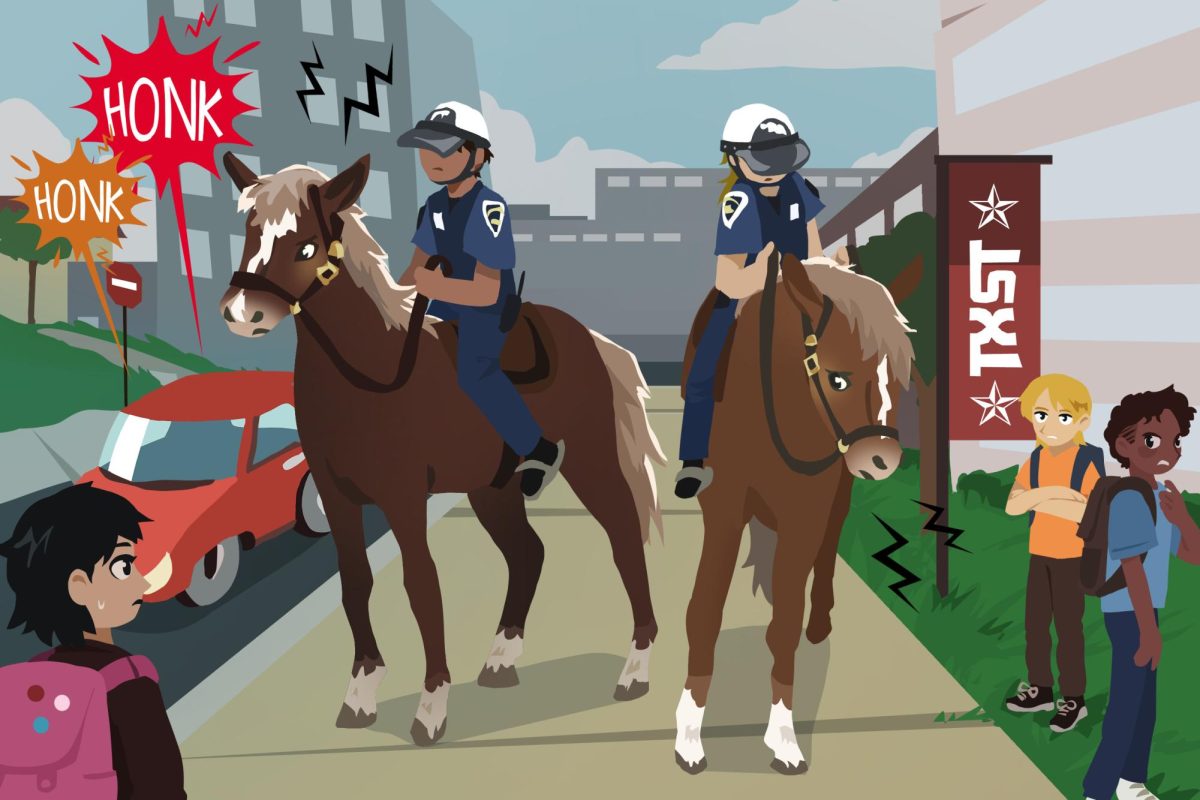When looking at the current housing situation on campus, can Texas State suffer from “too much of a good thing?”
After all, it is unequivocally good that more people are coming to Texas State. A larger class means more funding for programs, increased opportunities to expand services and a larger community of residents who can enjoy the benefits of on-campus living.
But this year, the University finds itself with an incoming class that it struggles to house, a problem that needs resolving before next year. As a result, rooms across campus went from doubles to triples. Resident assistants (RA) had roommates, and freshmen have been living in temporary residences set up in hotels across town from campus.
The reasons for this year’s overcrowding are the university’s requirement for freshmen to live in on-campus housing, the number of students it admitted and the lack of available housing for those students.
Unknown guests have been especially hard on those RAs who have roommates. Yordanos Kinfe, a biochemistry major and RA at Laurel Hall who had a roommate for the first three weeks of school, said these arrangements put an increased strain on RAs.
“Not only are we supposed to be RAs for the residents on our floor, we also have to be RAs for our roommate, meaning that we’re on the clock 24/7,” Kinfe said. “I feel like it isn’t appropriate to have residents as RA roommates.”
One reason for this housing shortage is the university’s policy of requiring on-campus housing for freshmen unless they meet specific criteria. According to the Department of Housing website, all students who graduated high school in the preceding year must live on campus.
While this policy intends to improve the student experience, it also means that even freshmen who could potentially commute must still purchase housing on campus. In addition, there are returning students who rely on the availability of on-campus housing. The current system has led to a scenario where freshmen who do not need accommodation have to buy it while returning students who need housing cannot acquire it.
To address this problem, the university should loosen requirements for freshmen living on campus. According to the Department of Housing website, the university already allows for exemptions such as students with marital status or who already live close to campus. Expanding those criteria will go a long way toward solving the housing issue moving forward.
Another reason is that Texas State, like universities across the country, admits more students than will arrive. According to U.S. News, students apply to more schools than they will attend.
Ava Melvin, a theatre education sophomore and RA at Retama Hall, explained that this policy is partially responsible for overcrowding on campus, as the university was unprepared for an increase in the percentage of applicants who decide to continue the process past acceptance.
“Every year they accept more students than they have room for,” Melvin said. “By the time school starts, people drop, or people go to other universities. This year more people chose to commit to Texas State than they were expecting.”
Once the university has extended an invitation to a potential student, they cannot just rescind it because they have reached capacity. Texas State must find alternative housing rather than simply not let them in.
Exacerbating this is that a disproportionate number of people who enroll later in the summer are first-generation students who are most likely to need the benefits of on-campus housing. The Department of Housing’s website points to research showing that living on campus increases opportunities to build community, more access to on-campus events and programs and leads to a higher overall GPA. Unfortunately, overcrowding means those students have to live in alternative housing rather than a place where they would be able to get a traditional college experience.
Finally, the most important reason for this predicament is simple: there is not enough housing for the number of students that want to live on campus. Luckily, housing is currently in the works; the construction of the Hilltop Housing Complex, according to the Capitol Projects Quarterly Status Report, will add 1006 beds worth of on-campus housing, greatly helping to ease housing tensions when construction completes.
If one’s response to this is wishing that the university had started construction two years ago, one might be surprised to hear that was the original plan. Two residence halls, Burleson and Hornsby, were demolished in 2019 to make way for the brand-new complex, but construction halted due to COVID-19. At the same time, it is easy to ask questions of ‘what if,’ the more important truth is that we can now see the consequences of waiting too long to build housing for the incoming residents.
Now, it is essential to note that many of the problems that Texas State is currently facing are problems universities across the country are also trying to solve.
However, with a new president and a new head of the Department of Housing, it seems that now is the perfect time to revisit policies that no longer serve students. Inaction on this issue ensures that we see the same overcrowding next year, overcrowding that puts a strain on both residents and RAs.
Regina Macias, an English and political science senior and RA at Laurel Hall, summed up the situation by pointing to the reality that there isn’t enough room to continue without making necessary changes.
“We don’t have space for this many people,” Macias said.
With that in mind, Texas State’s administration would do well to anticipate future growth. But unfortunately, Texas State is not suffering from too much of a good thing. We don’t have too many students; we have a lack of housing and policies, which exacerbate this issue. However, we can overcome these issues if the administration learns from this year’s lessons.
– Andrew Hodge is an English and communications senior
The University Star welcomes Letters to the Editor from its readers. All submissions are reviewed and considered by the Editor-in-Chief and Opinions Editor for publication. Not all letters are guaranteed for publication.
Opinion: Texas State needs to rethink housing before next year
October 7, 2022
Donate to The University Star
Your donation will support the student journalists of Texas State University. Your contribution will allow us to purchase equipment and cover our annual website hosting costs.

























